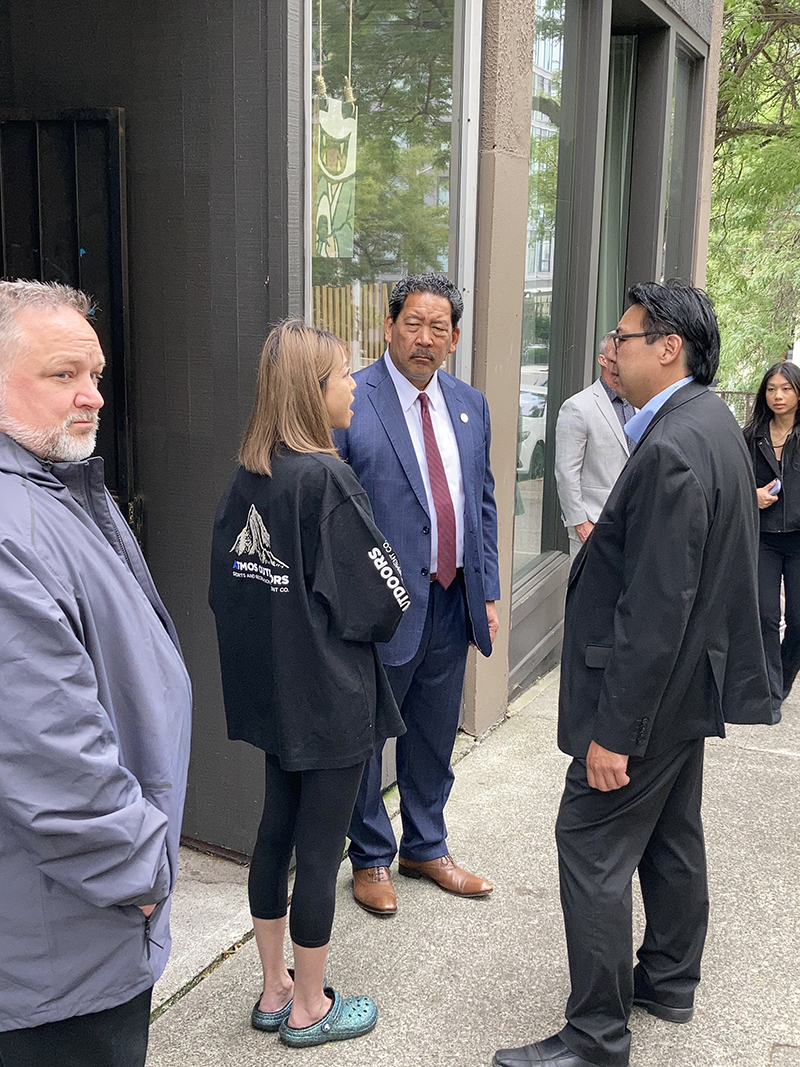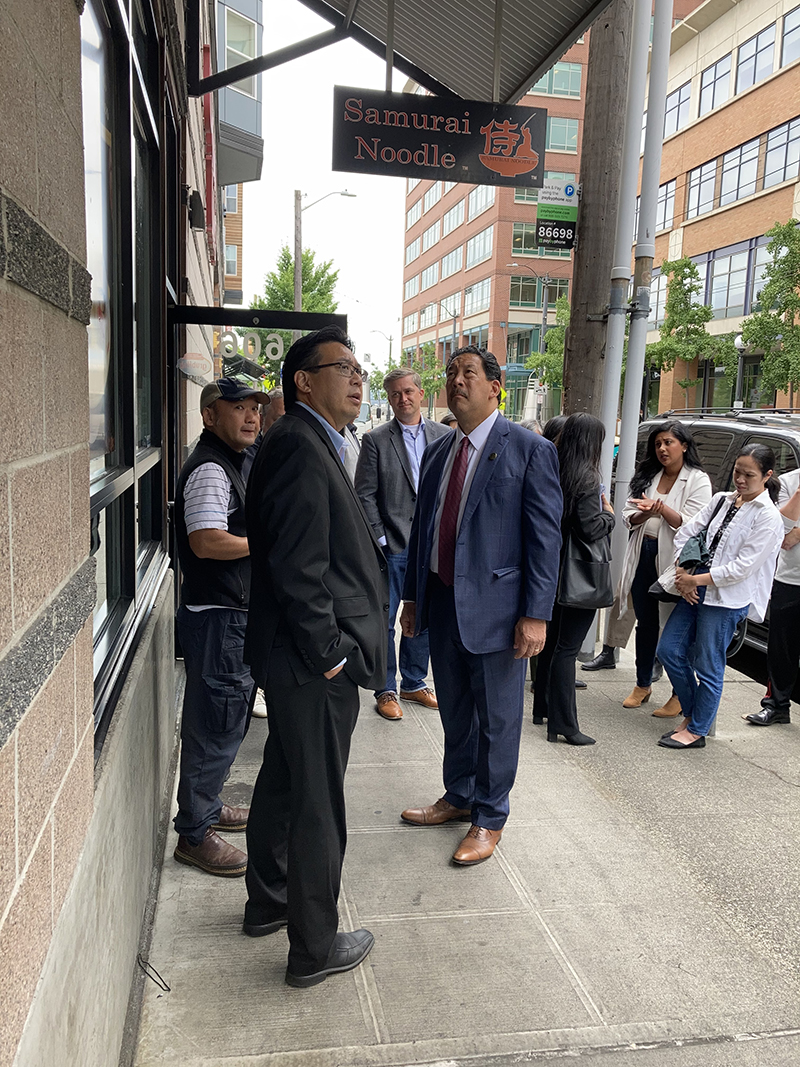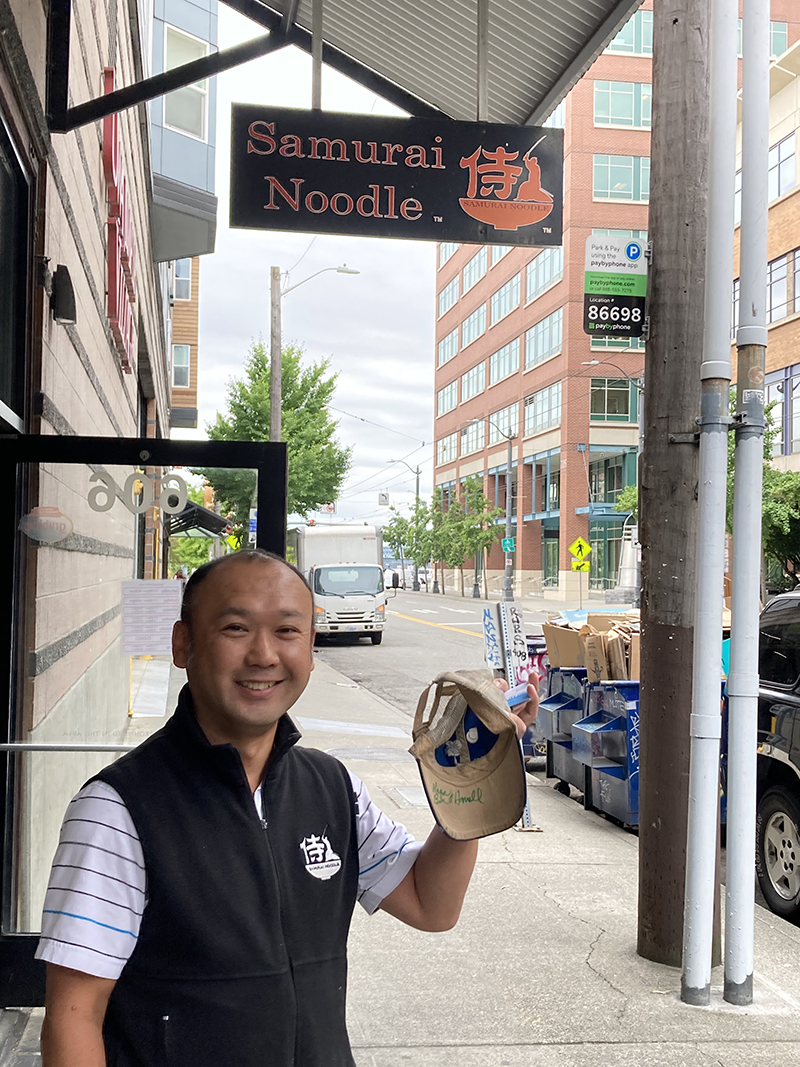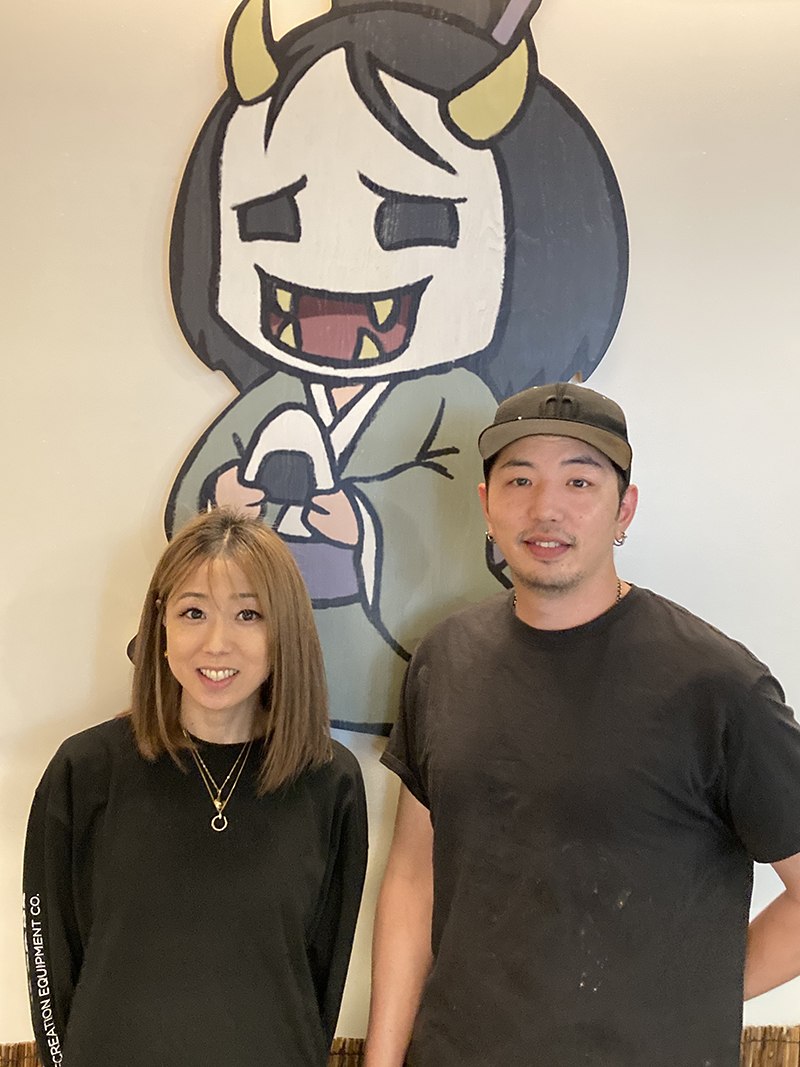By Mahlon Meyer
NORTHWEST ASIAN WEEKLY
Washington State Department of Commerce Director Michael Fong and Seattle Mayor Bruce Harrell toured the Chinatown-International District (CID) on Monday to celebrate the distribution of $400,000 in grants to 14 neighborhood restaurants and receive feedback from their owners.
The money was part of a total $79 million distributed by the commerce department as a second wave to help small businesses recover from the lingering effects of the pandemic.
Fong, whose father ran a restaurant, in his opening remarks to the press, said the pandemic had changed the economy.
“Many small businesses are family owned, providing a key pathway to building generational wealth,” said Fong. “Today, even as pressure from the direct financial impact of the pandemic is easing, small business owners are faced with ongoing obstacles as they adapt to new business models and uncertainties around workforce, supply chain disruptions, and other challenging economic conditions.”
Harrell said the city’s recovery depended on small businesses and restaurants.
“From the Chinatown-International District and downtown to neighborhoods across the city, we know an equitable recovery requires thriving small businesses who are the backbone of our local economy, integral to our communities, and vital in generating wealth for families,” he said. “I look forward to continued partnership with the state and with small businesses to advance these shared goals.”
More work to be done
The handful of business owners greeted by the two dignitaries, who were trailing a small army of press members, were grateful. They said the grants had helped them pay off debt and keep their doors open. But it was clear the struggle was far from over. In some cases, it has gotten worse.
“We’ve heard that we’ve done a lot of good work,” Harrell told Northwest Asian Weekly at the end of the tour. “But we’ve also heard there’s still a lot to do.”
Future opportunities
Anthony Anton, president and CEO of the Washington Hospitality Association, said that although the grants had already been given out, a number of small businesses had not collected their money, so there was still funding that would become available again.
“I’m waiting for that moment,” he told the Northwest Asian Weekly.
Low visibility
No one is waiting for that moment more than Marin Caccam—although in her case, it is more flexibility she wants from the city and the federal government.
Caccam’s Japanese restaurant, Onibaba, was the last stop on the tour with both Harrell and Fong in attendance.

From left: Washington Hospitality Association President and CEO Anthony Anton, restaurant owner Marin Caccam, Seattle Mayor Bruce Harrell, and Washington State Department of Commerce Director Mike Fong listen as Caccam shares feedback about running her restaurant, Onibaba (Photo by Mahlon Meyer)
Her struggles are emblematic of those of Japantown, in which Onibaba is located.
Among them is less development than Chinatown and a lack of visibility.
“The first thing people say on Instagram is, ‘I didn’t even know Seattle had a Japantown,’” she told Northwest Asian Weekly.
Indeed, as she stands out on the street in front of her restaurant, the only real foot traffic is people showing up to slide into her restaurant.
Hers was only one of a handful of small businesses in Japantown for as long as she can remember.
“I guess I’m just stubborn, I want to keep the business in the family,” she said. “My parents had really low points, too, but they got through it.”
That’s why the grant from the commerce department was a help.
It was for around $32,000 and helped her pay off debt from back taxes.
Struggles
Standing outside, as throngs of restaurant goers passed by to go inside, Caccam painted a picture of desperation that belied the busy scene of patrons enjoying the food prepared by her and her brother.
Her desperation, moreover, is felt by all restaurant owners in the neighborhood, she said.
“All restaurants here are going through this,” she said.
During the pandemic, restrictions that diners had to sit at least six feet apart meant she could only fit three customers at a time inside her restaurant.
“We didn’t have enough to pay our rent,” she said.
Food prices, taxes, and labor have all skyrocketed.
She and her brother, Shota, together had taken over the running of the restaurant from their parents. They sunk all their savings in.
It wasn’t enough.
She knew that if she went on this way, they would not survive financially.
So she came up with the plan of enlarging—opening a second restaurant next door, with fancier fare on the second floor, where she could charge more without losing customers.
Speaking of her evidently very popular eatery, she said, “If I raised prices every time taxes increased, I would lose my customers,” some of whom have been coming for decades.
But when she went to the Small Business Association (SBA) for a loan, she was denied.
“I didn’t have enough money in my account, and they thought if my business failed, I wouldn’t be able to pay them back,” she said.
So she took out a home equity loan on her home and used it to help finance the construction needed on her new restaurant next door.
But her troubles didn’t end there. In fact, it was only the beginning.
Getting all the necessary permits and making the necessary renovations to a historic building to make it in line with city codes was beyond her means.
The city required her to install an elevator, according to its code for accommodating people with disabilities, although the food on the second floor could also be ordered on the first floor.
She consulted 12 major contractors, and the price tag would have been between $1.8 to $1.9 million.
“I couldn’t afford that,” she said.
So she ended up finding a smaller contractor through another restaurant. But it meant she would have to oversee the entire project herself.
Meanwhile, she has been paying rent on the vacant building for months.
At the same time, she and her brother are still repaying loans given out during the pandemic.
“It’s not like you don’t have to pay for your electricity and water,” she said. “It’s rather that you don’t have to pay it now, but you have to repay it later.”
She added, “It’s not like I’m asking for money, or have ever asked for money, but when I need help, I need help.”
More foot traffic but in debt
Down the hill and across Jackson Street, the fate of a restaurant in the Chinatown part of the CID almost seemed to prove her point.
Despite its many struggles—violence in the streets, drug use, homeless encampments— there appeared to be more foot traffic here on Monday than up in Japantown.
The second stop on Fong and Harrell’s tour was Samurai Noodles, on Fourth Avenue, where the owner, Ryo Izawa, received a $60,000 grant.

Samurai Noodle owner Ryo Izawa (left) with Washington State Department of Commerce Director Mike Fong, and Seattle Mayor Bruce Harrell as they inspect the outside of Izawa’s restaurant (Photo by Mahlon Meyer)
Harrell in off-script remarks talked to him about a recent trip he took to a “small fishing village” in Japan. Fong responded to one of Izawa’s comments by saying, “And that’s why we’re here today.”
At the end, the owner took off his baseball cap and asked Harrell to sign it, which the mayor did in a large, florid, cursive hand.

Samurai Noodle owner Ryo Izawa displays a hat signed by Seattle Mayor Bruce Harrell (Photo by Mahlon Meyer)
The owner, smiling broadly, put it back on his head.
“The grant allowed me to keep my doors open,” he told Northwest Asian Weekly. He also had back taxes and rent.
Safety issues
The other restaurant visited by both Fong and Harrell represented an older, more established community presence. Here, in the heart of the neighborhood, the concerns were the same as most small businesses have been relaying to elected officials for years.
The owner of the Purple Dot Cafe, although he was not comfortable with sharing the amount of the grant he received, said it had been a “big support.”
But his biggest concern was still safety issues.
“The problem is people outside the CID think it’s not safe here, so they’ve stopped coming,” he said, giving his last name as Hsieh (Xie).
His restaurant was about three quarters full. But he spent a long time—about 15 minutes— talking with Harrell and Fong in Cantonese, with Fong apparently interpreting (the press was interdicted from covering that stop along the tour).
Other factors
In speaking with the Northwest Asian Weekly at the end of the tour, Harrell added one more thing he heard from the restaurant owners.
“They want to get the employers in the neighborhood to come back,” said Harrell. “All the remote work has affected street traffic.”
Mahlon can be reached at info@nwasianweekly.com.





It’s ironic that Mayor Harrell will contribute to the demise of the very businesses he visited if his plans for the North and South of CID preferred options prevail. It’s a question I want to ask him in a meeting, but he has yet to respond to my request for an in-person meeting, an invitation issued over two weeks ago.